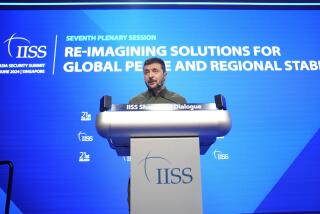Soviets, Chinese Differ on the Date for Summit
- Share via
BEIJING — A new era of improved Sino-Soviet relations got off to a shaky start Saturday with conflicting statements by high Soviet and Chinese officials on whether the two sides have agreed on mid-May as the date for the first Sino-Soviet summit in 30 years.
Soviet Foreign Minister Eduard A. Shevardnadze announced at a Beijing press conference Saturday: “We agreed on the date of the forthcoming Soviet-Chinese summit. The visit of (President) Mikhail (S.) Gorbachev to the Chinese People’s Republic will take place in mid-May of this year.”
Shevardnadze went to the airport immediately after the press conference, and minutes after his plane was in the air, Chinese Vice Foreign Minister Tian Zengpei contradicted him.
The mid-May date is “a time frame proposed by the Soviet side,” Tian told reporters at the airport. “But with regard to the specific timing of such a summit, it has yet to be decided. . . . The Chinese side wishes to study the time frame proposed by the Soviet Union and is ready to have consultations with the Soviet Union about the specific time.”
The two sides had announced Friday that China invited Gorbachev here for a summit meeting and that the Soviets had accepted.
Saturday’s confusion did not appear to affect the basic accord that there will be a summit between Gorbachev and China’s senior leader, Deng Xiaoping. But it was not clear whether Shevardnadze overstated the firmness of the mid-May date, or Tian was misinformed or China had some other motive for contradicting Shevardnadze.
Possible motives for China to say that the time has not been firmly fixed could include a desire to maintain Soviet uncertainty about the summit and thus boost Beijing’s leverage during talks about settlement of the conflict in Cambodia.
Gorbachev has actively sought a summit meeting, but Soviet support for Vietnam’s decade-long intervention in Cambodia has been a key obstacle to improved Sino-Soviet ties. China has supported a Cambodian resistance coalition and demanded that Vietnam withdraw its troops from the country.
The Soviet Union and China have reached agreement on many issues concerning Cambodia, and both now advocate that Vietnam withdraw its troops by September.
But in his airport talk with reporters, Tian said that China hopes the Soviet Union will make further efforts to facilitate a Cambodian settlement. Tian said that China still hopes the Soviet Union will agree that the Phnom Penh government should be disbanded as part of a political settlement and replaced with a provisional government of national reconciliation.
Soviets Oppose Peacekeepers
China also wants the United Nations to assign a peacekeeping force to guarantee any political settlement in Cambodia, but the Soviet Union has not agreed to this.
Another possible motive for China to speak uncertainly about the date for the summit could be questions about Deng’s health.
Shevardnadze met Deng in Shanghai on Saturday morning, and the 84-year-old Chinese leader appeared to be in good health. Some foreign press reports have said that China favors an early summit date because of concern about Deng’s health. There have also been reports that Deng has a prostate problem.
Shevardnadze said Saturday that the summit meeting--and the normalization of relations between the two Communist powers that it would achieve--should contribute to economic development in both countries.
“Let me emphasize that we are speaking of a complete normalization of our relations,” he said. “When we speak of the norm for two great powers, for two permanent members of the United Nations’ Security Council that have a lengthy common border, when we speak of two socialist countries, it is obvious that we have in mind a very high norm.”
The Soviet Union looks forward to “a more large-scale and more efficient cooperation in the economy, trade, scientific research and development, and also in tackling environmental problems, which . . . have become rather acute. . . .” he added.
More to Read
Sign up for Essential California
The most important California stories and recommendations in your inbox every morning.
You may occasionally receive promotional content from the Los Angeles Times.













